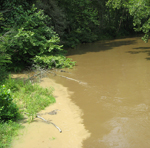Written by Erin Savage
Erin Savage
While Erin prefers to be on rivers rather than at a desk, as our Central Appalachian Program Manager she devotes a lot of time delving through data to make it meaningful to others who care about the health of our waterways.
Science-backed lawsuits protect clean water in Central Appalachia
 A recent federal court decision found that conductivity released from mines violated clean water laws. Another case just filed in Virginia challenges the discharge of total dissolved solids from mines in watersheds already damaged by high levels of total dissolved solids. Both cases could result in stronger protections for Central Appalachian streams.
A recent federal court decision found that conductivity released from mines violated clean water laws. Another case just filed in Virginia challenges the discharge of total dissolved solids from mines in watersheds already damaged by high levels of total dissolved solids. Both cases could result in stronger protections for Central Appalachian streams.
Another coal-related chemical spill in Central Appalachia
Announcing the new and improved ACE Project website
 The Appalachian Water Watch team is proud to announce the new and improved ace-project.org the website of the Appalachian Citizens Enforcement Project. Upgrades to the website help the efforts of citizen scientists and provide transparency for water quality monitoring processes.
The Appalachian Water Watch team is proud to announce the new and improved ace-project.org the website of the Appalachian Citizens Enforcement Project. Upgrades to the website help the efforts of citizen scientists and provide transparency for water quality monitoring processes.
West Virginia Patriot Slurry Spill MCHM Test Results

Preliminary water testing results from the February West Virginia coal slurry spill that blackened six miles of Fields Creek reveal that pollutants included MCHM, the coal-washing chemical that contaminated the drinking water of 300,0000 West Virginians in January. This finding is significant because state environmental officials appeared to be uncertain whether MCHM was involved — it seems that once more, polluting companies withheld important information from the public.
Some Results, Few Conclusions in West Virginia’s Crude MCHM Spill

Appalachian Voices’ Appalachian Water Watch team has received results from several locations impacted by the crude MCHM and PPH spill in Charleston, W.Va. While a superficial review of the results might seem to indicate that flushing individual water systems was effective in eliminating most of the MCHM from the pipes, when combined with additional data and personal observations from affected residents, the conclusions become less clear.
Realities on the Ground in the West Virginia Water Crisis

I checked Facebook early on the morning of January 9th, cursing my mild addiction to social media, and was suddenly glad that I had. I saw a news report of a chemical spill in Charleston, W.Va., which I quickly emailed to the rest of the staff at Appalachian Voices. I then packed a bag anticipating the potential to be gone for several days. I knew as little about what I might be doing through my work with Appalachian Water Watch as I did about what exactly had happened in Charleston.
Changing Tides of Collaboration in Central Appalachia
For more than 15 years, Appalachian Voices has worked to protect the air, land and water of Central Appalachia. We do this work because the protection of the place we live is integral to the health, happiness and prosperity of our communities. We do this work for the benefit of all people in Central Appalachia.
Despite this, we often feel bogged down in contentious rhetoric that pits “treehuggers” against “friends of coal.” We often must spend all our time dealing with problems — water pollution, dust problems and violations of existing laws — when we’d much rather focus on collaboration and finding solutions.
Mapping Forest Change in Mountaintop Removal
Researchers at the University of Maryland have just…
EPA Helps Kentucky Roll Back Water Quality Protections
Just today, after several months of delays, the…
Concerns Grow Over the EPA’s Stance on Selenium Pollution
In February, we wrote about the new selenium…



